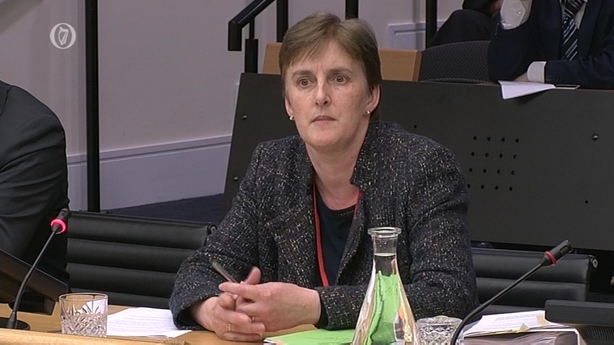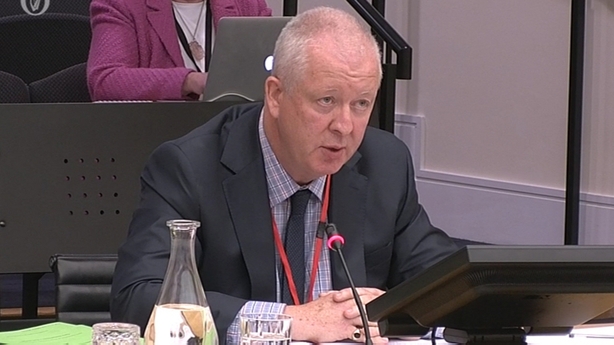A former Central Bank deputy governor has told the banking inquiry that Seán Quinn's exposure to Anglo Irish Bank in July 2008 threatened the stability of the financial system.
Tony Grimes said the businessman's increasing stake in Anglo was highly unusual.
Mr Grimes was the number two at the Central Bank during the crisis before stepping down in 2011.
He said a high-level group including the Central Bank and the Department of Finance discussed Mr Quinn's mounting debts to Anglo in July 2008.
He said the situation was highly unusual and was affecting the stability of the entire financial system.
However, he said the problem was the responsibility of the Financial Regulator.
Mr Grimes conceded that the Central Bank's warnings were not sufficiently strong.
Later, the former head of banking supervision at the Irish Financial Services Regulatory Authority said they were seriously hampered by a lack of staff and were undermined by senior executives.
Mary Burke said they could not pursue sanctions against banks because of a lack of resources, and this meant the bank did not see them as a serious threat.

They got three extra staff in 2007 but a request for more resources in May 2008 was refused.
There were 50 staff to monitor 80 banks. Three regulated Bank of Ireland and Anglo Irish Bank while three watched AIB and Irish Life and Permanent.
She said it was difficult to convey the scale of pressures management and staff were working under, particularly from autumn 2007 onwards.
The "unrelenting" onslaught of demands with staff working long hours ultimately became unreasonable and unsustainable.
Mr Grimes also said the consultancy advice received by the government prior to the guarantee ruled out the option of allowing an Irish bank to fail and go into liquidation without any government intervention.
He said the advice from Merrill Lynch was that a guarantee of all bank liabilities would be the most decisive measure in tackling the escalating and unsustainable liquidity losses.
However, he added that it also raised issues about the credibility of the guarantee in the light of the huge sums involved.
€40bn in emergency liquidity assistance was extended to Irish banks by the end of September 2008 compared to €5bn one year earlier.
Mr Grimes said the system could not continue on this basis without the banking system imploding.
An urgent and decisive intervention was required that would not just finance the outflows but change the dynamic of the unprecedented scale of liquidity losses and prevent contagion from Anglo to the rest of the system.
In his written statement, Mr Grimes said he was in government buildings on the night of the guarantee but was not present for the decision.
The possible nationalisation of Anglo raised issues, he said, both in terms of lack of an immediate legislative provision (although it could perhaps have been ready by the following weekend) but also because it might have been viewed by the markets more negatively than a guarantee.
He said the guarantee was the best option.
He said outflows of corporate deposits in the two weeks from mid-September shows a pattern of increasing losses and particularly on Monday 29 September.
The losses by Anglo were particularly severe over the two-week period and losses on this scale were regarded as unsustainable.
He echoed John Hurley's view that the Central Bank had no role in assessing the risk of insolvency in individual banking institutions.
Mr Grimes said he accepted they did not anticipate or communicate the serious crisis that befell the Irish financial system culminating in the guarantee decision at end-September 2008 and the subsequent need for extensive bank recapitalisation.
He said the government wanted to avoid if possible the nationalisation of Anglo and wanted to see a market solution.
He could not recall another discussion in the Central Bank of alternatives to nationalisation although he was aware that the government sought the advice of Merrill Lynch on this issue.
Some of his statement has been redacted due to restrictions in the Central Bank Act.
The former deputy governor denied the government knew two banks were insolvent and the guarantee was put in place to allow them to survive.
Mr Grimes said discussions at the end of September 2008 centred on contingency planning and it was not clear two banks were insolvent.
Socialist Party TD Joe Higgins said it was clear from meetings that it was known at the highest level of government and the Central Bank that two institutions were insolvent.
Mr Grimes said he did not form that view.
A meeting just days before the guarantee, between the taoiseach, the minister for finance, the Central Bank and NTMA on 26 September 2008, was told by the Regulator that problem was liquidity, not solvency.
However, a senior Department of Finance official told the meeting that one bank needed €2bn after capital and another had a €8.5bn hole.
Mr Higgins said this implied they were insolvent. Mr Grimes denied this.
There were also discussions that the Central Bank would need a letter of comfort from the minister for Finance in order to continue extending ELA.
He said the bank's Financial Stability reports did highlight risks but not sufficiently.
Labour's Ciarán Lynch asked if the Regulator was accountable to the board of the Central Bank.
Mr Grimes said it was not, although there was a possibility of issuing guidance, but this was never exercised.
The Central Bank started contingency planning for bank interventions back in Autumn 2007. By February 2008, Mr Grimes said they were working on a possible guarantee.
They were moving beyond an academic exercise at that stage and realised they better be prepared.
Asked by Fine Gael's Eoghan Murphy if they should have intervened by March 2008 after enormous share price falls, Mr Grimes said with hindsight some intervention would have been good.
He said the green jersey agenda, asking banks to support each other, was an exhortation to local banks at a sensitive time.
He was not aware the Department of Finance was aware of this approach.
Inquiry hears about 2006 stress tests
The former prudential director and head of banking supervision at the Irish Financial Services Regulatory Authority, Con Horan, said that there was a stress test conducted in 2006, albeit with the IMF involved.

He said the outcome of the process was that in an adverse scenario, the banking system was going to hold up strong.
He told the banking inquiry that in 2005 he had proposed increasing capital on high loan-to-value mortgages, which were not accepted then, but were accepted in 2006.
Mr Horan said that each department put forward their request for resources and that it is his understanding that the budget committee did not endorse the banking supervision department request, because the committee felt, from a technology perspective, the department was weak.
He said that in July 2008 there would have been an international view that Irish banks would have been able to ride out the difficulties at the time.
He said that there were serious issues around March 2008 and it was clear that there were institutions under significant pressures.
Mr Horan said it would have been an item of discussion at domestic standing group meetings, of which he was part.
He said he had tried to intervene in 2005 and said that it would have been better had proposals been introduced then, or earlier.
He said the 2006 stress test was carried out in conjunction with the IMF and that he has no reason to believe that it was not conducted in a vigilant way.
He said that in September 2008, he would have been engaged in discussions about all of the financial institutions and their insolvency situations.
Mr Horan said that there was more concern about some banks than others, in general, at that time.
He said they left regulatory interventions too late.
They should have intervened earlier, possibly in 2006, to ensure more acceptable levels of growth.
Mr Horan said he had been vilified in the media.
Sinn Féin's Pearse Doherty asked about his appearance on the Anglo Tapes where he suggested to executives in Anglo to act ethically and not to kill the golden goose of the guarantee.
However, Mr Doherty said other tapes heard laughter and "jousting".
Banking inquiry chairman Ciarán Lynch intervened and said the question could not be posed because of legal issues.
In 2005, he was not comfortable with the levels of growth in the market and made proposals in 2005 for increases in capital charges.
He said he spoke to the chief executive and said this was the biggest risk and they needed to intervene.
His proposals were not put into place.
At the end of 2004, he said he asked for specialists to pursue administrative sanctions against the banks.

